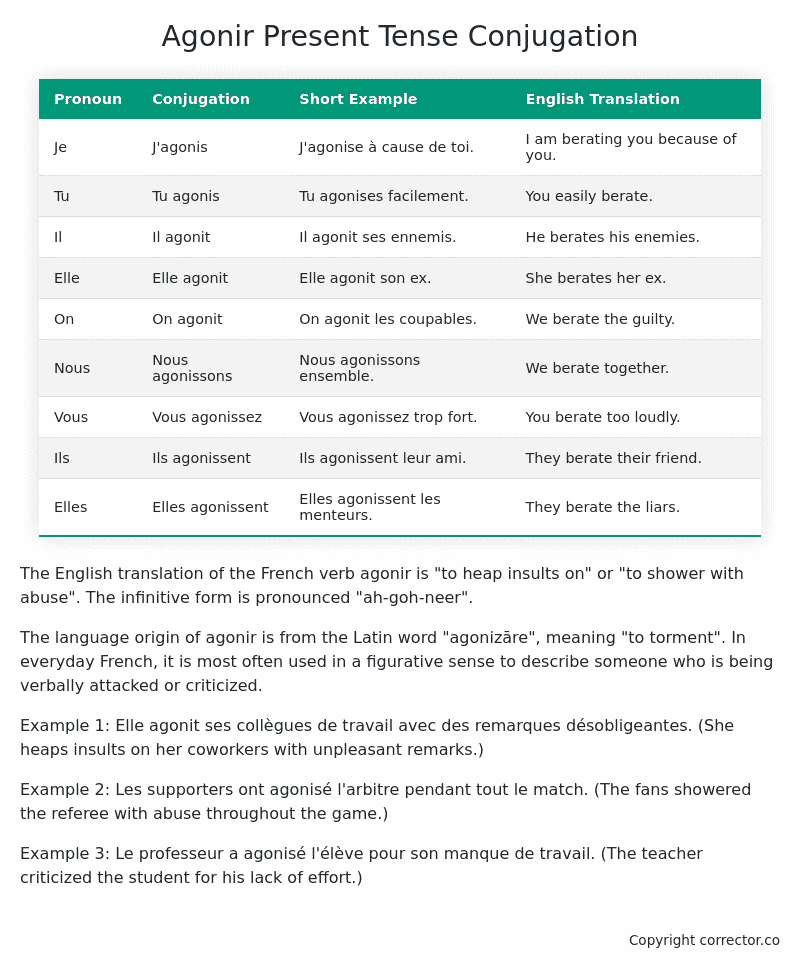Le Present (Present Tense) Conjugation of the French Verb agonir
Introduction to the verb agonir
The English translation of the French verb agonir is “to heap insults on” or “to shower with abuse”. The infinitive form is pronounced “ah-goh-neer”.
The language origin of agonir is from the Latin word “agonizāre”, meaning “to torment”. In everyday French, it is most often used in a figurative sense to describe someone who is being verbally attacked or criticized.
Example 1: Elle agonit ses collègues de travail avec des remarques désobligeantes. (She heaps insults on her coworkers with unpleasant remarks.)
Example 2: Les supporters ont agonisé l’arbitre pendant tout le match. (The fans showered the referee with abuse throughout the game.)
Example 3: Le professeur a agonisé l’élève pour son manque de travail. (The teacher criticized the student for his lack of effort.)
Agonir – About the French Present Tense
To take a deep dive into all the French tenses then see our article on Mastering French Tense Conjugation.
Common Everyday Usage Patterns For Le Present
Interactions with Other Tenses
Table of the Present Tense Conjugation of agonir
| Pronoun | Conjugation | Short Example | English Translation |
|---|---|---|---|
| Je | J’agonis | J’agonise à cause de toi. | I am berating you because of you. |
| Tu | Tu agonis | Tu agonises facilement. | You easily berate. |
| Il | Il agonit | Il agonit ses ennemis. | He berates his enemies. |
| Elle | Elle agonit | Elle agonit son ex. | She berates her ex. |
| On | On agonit | On agonit les coupables. | We berate the guilty. |
| Nous | Nous agonissons | Nous agonissons ensemble. | We berate together. |
| Vous | Vous agonissez | Vous agonissez trop fort. | You berate too loudly. |
| Ils | Ils agonissent | Ils agonissent leur ami. | They berate their friend. |
| Elles | Elles agonissent | Elles agonissent les menteurs. | They berate the liars. |
Other Conjugations for Agonir.
Le Present (Present Tense) Conjugation of the French Verb agonir (this article)
Imparfait (Imperfect) Tense Conjugation of the French Verb agonir
Passé Simple (Simple Past) Tense Conjugation of the French Verb agonir
Passé Composé (Present Perfect) Tense Conjugation of the French Verb agonir
Futur Simple (Simple Future) Tense Conjugation of the French Verb agonir
Futur Proche (Near Future) Tense Conjugation of the French Verb agonir
Plus-que-parfait (Pluperfect) Tense Conjugation of the French Verb agonir
Passé Antérieur (Past Anterior) Tense Conjugation of the French Verb agonir
Futur Antérieur (Future Anterior) Tense Conjugation of the French Verb agonir
Subjonctif Présent (Subjunctive Present) Tense Conjugation of the French Verb agonir
Subjonctif Passé (Subjunctive Past) Tense Conjugation of the French Verb agonir
Subjonctif Imparfait (Subjunctive Imperfect) Tense Conjugation of the French Verb agonir
Subjonctif Plus-que-parfait (Subjunctive Pluperfect) Tense Conjugation of the French Verb agonir
Conditionnel Présent (Conditional Present) Tense Conjugation of the French Verb agonir
Conditionnel Passé (Conditional Past) Tense Conjugation of the French Verb agonir
L’impératif Présent (Imperative Present) Tense Conjugation of the French Verb agonir
L’infinitif Présent (Infinitive Present) Tense Conjugation of the French Verb agonir
Struggling with French verbs or the language in general? Why not use our free French Grammar Checker – no registration required!
Get a FREE Download Study Sheet of this Conjugation 🔥
Simply right click the image below, click “save image” and get your free reference for the agonir Present Tense tense conjugation!

I hope you enjoyed this article on the verb agonir. Still in a learning mood? Check out another TOTALLY random French verb present conjugation!


